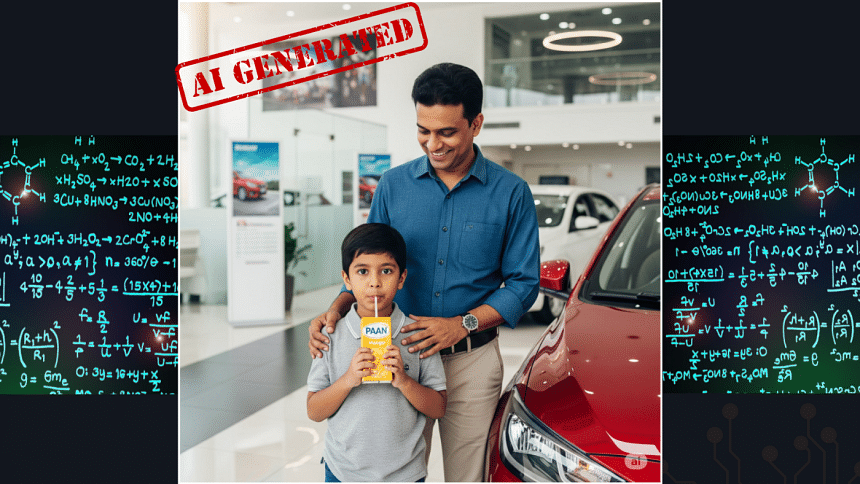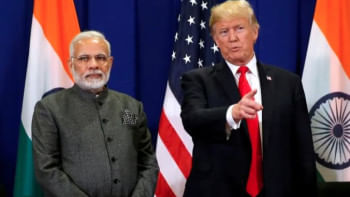'Dear AI, please sell my product – make it emotional'

A father and son duo are at a car showroom – the little boy gleaming with excitement after the purchase of their first luxury car. The father looks lovingly at the child, but wait – there is something inherently odd about the way he stares at his own son.
His dead eyes resemble a pair that has seen despair at its core. It's as if he is staring into the void when he says, "Son, let's take you somewhere special," after an epiphany strikes while watching him gleefully sip a pack of mango juice. They eventually drive to a rural area, where the father is reunited with his childhood friend. As he goes to hug him, we see an additional hand spawn out of his back, as if ripped straight from the pages of a horror manga.
By now, many of you have guessed that this advertisement – for a pack of "fruit drink," no less – is AI-generated. Brands are moving towards AI-generated stills, videography, and even full-fledged ads at a furious pace, opening up avenues of discussion on ethics and their implications for the industry.
The most obvious consequence of this surge in AI use has to be the deprivation of artists from jobs they would otherwise have. For a typical 2-minute OVC, an ad agency would have to commit to the cost of casting, filming, editing, and sound – a sizeable fee. It is becoming increasingly lucrative for companies to cut costs by simply using an AI render of what they envisioned.
The problem is that neither the brands nor the agencies have a solid grasp of how to use these tools, often resulting in subpar proof-of-concept material being released as full-fledged ads. However, in front of an audience that often applauds mediocrity wrapped in novelty, it is deemed acceptable.
"This kind of content feels so inauthentic and cheap. The 'people' are hollow, and it just feels disingenuous," says director Nuhash Humayun. According to the "Dui Shaw" director, ham-fisted AI work directly devalues the brand. "Consumers want to believe in brands that believe in them. If the brand is too cheap to use real people, what does that say about the product? Marketing is about building trust with consumers. If a brand makes me go, 'Oh wow, this company LOVES cutting costs and doesn't respect human labour,' I don't know if that's a great marketing strategy," he notes.
Music director Fuad Almuqtadir highlights the dire concerns the relentless use of AI brings for musicians. "At a gathering with some of my colleagues, we were messing around with AI to generate diss tracks. We started by having a jolly good time with the novelty, but the session ended with dire concern on everyone's faces – these prompts were producing believable, catchy music in five minutes!"
While Fuad jokingly says he is ready to retire, he points out that this is a reality the industry must face. "Brands are already using this tool to create jingles – a craft that previously required creativity and real musicians. I really don't have an answer for where we go from here, but we do need to adapt quickly."
That said, there is a way for brands to use AI without turning every campaign into a soulless cost-cutting exercise. Ethical use doesn't mean ditching technology; it means knowing its place. AI can be a great tool for storyboarding, mood exploration, or spitting out quick mock-ups before real artists step in to give it heart. But if you're going to use it, say so. Own it. Let your audience know what's AI and what's human. Because the moment brands start hiding behind machine-made work without transparency – or worse, use it as an excuse to erase human labour entirely – trust breaks. AI should be a brush, not the painter. Otherwise, all you're left with is a gallery of lifeless ads no one will remember.
"Unfortunately, our intention isn't to make communication better or more exciting for the audience," says director Abrar Athar. "We're just looking for the laziest, cheapest way to get the job done, assuming our audience is dumb and will lap up anything given to them. AI can be an amazing tool, but our heart isn't in the right place."
There is no doubt that there are brands producing incredibly dubious content, looking to cut corners – much like cartons of sugary drinks on Friendship Day. It is also true that right now, there is no concrete answer to how the media industry will tackle the burgeoning "AI" question. But there is no denying that this is another future we must embrace – and this time, with the right intentions.
The author is Entertainment Editor at The Daily Star.

 For all latest news, follow The Daily Star's Google News channel.
For all latest news, follow The Daily Star's Google News channel. 












Comments